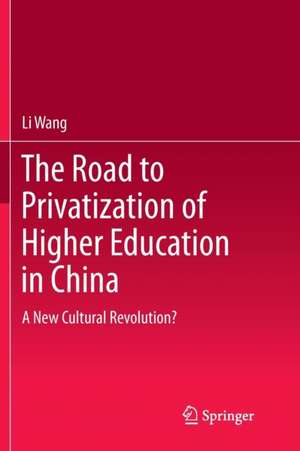The Road to Privatization of Higher Education in China: A New Cultural Revolution?
Autor Li Wangen Limba Engleză Paperback – 27 aug 2016
| Toate formatele și edițiile | Preț | Express |
|---|---|---|
| Paperback (1) | 378.34 lei 6-8 săpt. | |
| Springer Berlin, Heidelberg – 27 aug 2016 | 378.34 lei 6-8 săpt. | |
| Hardback (1) | 385.47 lei 6-8 săpt. | |
| Springer Berlin, Heidelberg – 18 dec 2013 | 385.47 lei 6-8 săpt. |
Preț: 378.34 lei
Nou
Puncte Express: 568
Preț estimativ în valută:
72.40€ • 75.68$ • 61.18£
72.40€ • 75.68$ • 61.18£
Carte tipărită la comandă
Livrare economică 06-20 martie
Preluare comenzi: 021 569.72.76
Specificații
ISBN-13: 9783662513477
ISBN-10: 3662513471
Pagini: 121
Ilustrații: VIII, 113 p. 10 illus.
Dimensiuni: 155 x 235 x 7 mm
Greutate: 0.19 kg
Ediția:Softcover reprint of the original 1st ed. 2014
Editura: Springer Berlin, Heidelberg
Colecția Springer
Locul publicării:Berlin, Heidelberg, Germany
ISBN-10: 3662513471
Pagini: 121
Ilustrații: VIII, 113 p. 10 illus.
Dimensiuni: 155 x 235 x 7 mm
Greutate: 0.19 kg
Ediția:Softcover reprint of the original 1st ed. 2014
Editura: Springer Berlin, Heidelberg
Colecția Springer
Locul publicării:Berlin, Heidelberg, Germany
Cuprins
Introduction.- Higher education in China: local, national and global context.- Privatization of higher education: theoretical underpinnings.- Implementation of privatization: scale and scope.- Financing higher education: changing rationales for funding.- Control and regulation of higher education: innovated university governance.- Rethinking privatization of higher education in China: lessons and impacts.- References.
Recenzii
“The book not only provides an empirical discussion of the implementation of the privatization of HE in the Chinese context, but also imposes a conceptual clarification concerning the retreat of the state, the relationship between the state, the market and university, and educational inequality. … this book should be valuable for anyone working in the area of China studies, not only those concerned with HE or privatization.” (William Yat Wai Lo, Higher Education, Vol. 74, 2017)
Notă biografică
Dr. Li Wang is a highly motivated researcher in educational studies. She completed her PhD in East Asian Studies, though her research continues to be interdisciplinary. Dr. Wang’s research involves the sociology of education, education policy, educational inequality and social exclusion. Her work has been published in peer reviewed journals and presented at international conferences. She has also received a number of scholarships and grants for outstanding academic performance.
Textul de pe ultima copertă
This book makes both empirical and conceptual contributions to the debate on privatization of higher education in China. Empirically, it aims to fill a gap in our knowledge of privatization of higher education in North China. To this end, Beijing was chosen as a case for analysis, and nine local higher educational institutions were visited. The case study strategy is also complemented by an extensive review of national policies to reveal problems beyond the specific case of Beijing and of national concern. The effects of the cultural and socioeconomic background and the unique state-party controlling system on higher education management are stressed. Conceptually, most existing studies on privatization of higher education in China adopt a policy analysis approach, while research on privatization of other public sectors or in other countries is frequently guided by economic theories. This book thus seeks to combine both social policy and econometric approaches to provide a systematic and detailed investigation of the privatization process in the context of higher education. It also improves examines the applicability of western theories in the Chinese context.
Caracteristici
First book on privatization of higher education in North China highlights the unique political, economic and cultural background of China Focuses on different practices of and rationales behind the privatization of higher education in China Challenges current assumptions on changes in Chinese higher education ?







